URBANA – This has been a record year for Cunningham Township.
The township, which serves the same area as the city of Urbana, spent $100,000 over budget this fiscal year in its quest to help residents pay rent.
“We have never, ever seen a budget like this,” said Cunningham Township supervisor Danielle Chynoweth. “We went over some last year, but nowhere close to what this looks like.”
The budget for Cunningham Township’s rental assistance was supposed to be $178,000 for the fiscal year ending on June 30. Instead, the local government body had spent $278,000 by May.
Chynoweth said the township is discussing changes so this doesn’t happen again, like increasing the budget and cutting down on the number of people served.
She said the office does not turn people away when they ask for support.
“We do not stop providing rental assistance even when we’re out of budget; we do budget reallocations,” said Chynoweth.
She said almost two thirds of renters in Champaign and Urbana are rent burdened, meaning they pay more than a third of their income towards housing.
“We’re seeing about 40% of calls to 211 are for housing support,” she said.
According to Chynoweth, the demand for their food delivery service, Sharing Table, is often triple the demand from the previous year.
“Some of that could be the word getting out about our program — although it has been in place since 2020 so it’s hard to say that is the primary issue,” she said.
Half of the households in Champaign are below the United Way’s ALICE threshold, which stands for Asset Limited, Income Constrained, Employed. That puts the city of Champaign second only to Waukegan among large Illinois cities for the most families in poverty.
Urbana has even more families under the ALICE threshold at 59%, according to the United Way of Champaign County.
“This last year was probably the hardest economic year for Urbana residents that we’ve seen since I came to office, so the last seven years,” said Chynoweth. “Rental assistance, utility assistance and food assistance requests are all up, and that is an indication of increasing precarity.”
Mae Antar is a reporter at Illinois Public Media.

